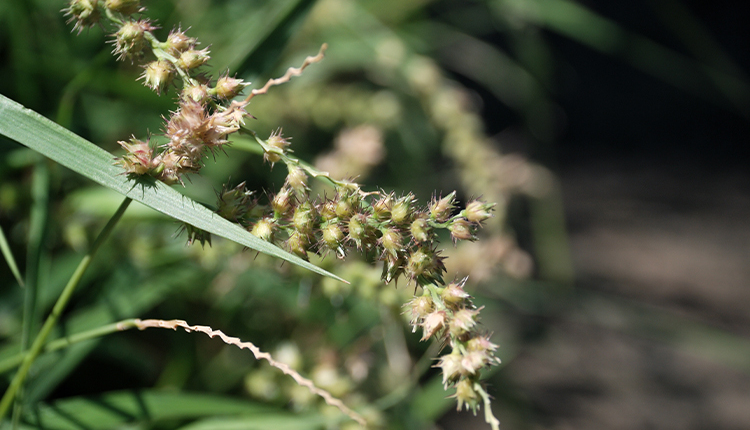
Throughout Texas and the surrounding region, hay growers are experiencing significant economic loss due to sandbur. While they can see that sandbur reduces the quality and quantity of forage, many are struggling to control it. Bayer Range and Pasture knows why and is here to help.
When it comes to treating sandbur, follow the label directions and apply Rezilon® herbicide accordingly. Years of research went into developing our sandbur program — a recommendation that we stand behind. You may think it’s too early to start with a late-January or early February application, but you are actually right on time. That’s the most important thing landowners who are facing sandbur infestations need to know right now.
The Problem
At Bayer Range and Pasture, we have heard from hay growers throughout Texas and the surrounding region who are having difficulty controlling sandbur with preemergence herbicides. What many may not realize is that while sandbur is generally thought of as an annual species, some are actually perennial. These perennial species are more prevalent than once thought and are complicated to control because preemergent herbicides are not effective on them. It takes a comprehensive approach and diligence to control sandbur, especially these perennial species.
A Comprehensive Program
Since there is not one simple solution to treat both annual and perennial species, reclaiming pastures from sandbur requires a comprehensive approach. Luckily, Bayer Range and Pasture has a new, five-step plan to control sandbur.
1) Start with a soil test. One of the biggest factors when combating sandbur is having a strong and healthy crop. Soil tests consistently done from year to year will lead to competitive bermudagrass stands better suited to compete with sandbur.
2) Apply Rezilon herbicide in the late winter. Rezilon is the foundation of a good sandbur control program. It effectively controls newly germinating sandbur seedlings in bermudagrass, bahiagrass, or other warm season perennial pastures and hay fields. Rezilon should be applied as early as mid-January through February 14 for optimal results so that it may begin working before weeds emerge. Once applied, it can sit on the soil surface for some time with no degradation from sunlight while waiting on rainfall for activation.
3) Frequent field scouting for perennial plants and/or escapes. Scouting for perennial plants is the next key factor to a successful sandbur program. This should begin in the late fall while sandbur seed heads are still attached to the plants. This makes them easy to identify and mark for inspection in coming months. In late January through March, landowners should return several times to those marked plants to see if they are persisting over the winter. This can be determined by digging up plants and inspecting the crowns for new green leaves, living stems, or roots and crowns that are alive and white in color. If present, be prepared to make a postemergent herbicide application once sufficient vegetation exists to take up the spray, which will most likely be after the first hay harvest.
4) A postemergence application of Pastora® herbicide + Roundup® (4-pound formulation) to control established or perennial plants. Pastora is a postemergent herbicide that controls seedling sandbur as well as 25 other problem grasses in bermudagrass pastures. Pastora can be applied in early spring before desired forage reaches 2 inches, otherwise it is best utilized soon after a hay harvest before the bermudagrass crop foliage has begun to regrow. Although Pastora will control seedling sandburs that have recently germinated from the seed, perennial sandburs regrowing from perennial root structures require the addition of Roundup. Apply Pastora (1.25 oz/acre) with 8 fl oz/acre of a 4-pound-per-gallon Roundup herbicide in an 80% water and 20% UAN carrier with 0.25% nonionic surfactant. This application should be made soon after a hay harvest, before the bermudagrass foliage has much regrowth to absorb the spray but while good coverage of the prostrate growing sandbur plants can be achieved.
5) A sequential Rezilon application midseason. In June to early July, immediately after a hay harvest, apply Rezilon to control sandburs germinating from the seed during the late season.
As mentioned at the beginning, if you think it’s too early to start, you are actually right on time. Now is the perfect time to put this plan into action and stop sandbur in its tracks. At Bayer Range and Pasture, we know hay growers in the Southwest are struggling to solve this problem, and we are here to help.
Bayer is a global enterprise with core competencies in the life science fields of healthcare and nutrition. Its products and services are designed to benefit people by supporting efforts to overcome the major challenges presented by a growing and aging global population. At the same time, the Group aims to increase its earning power and create value through innovation and growth. Bayer is committed to the principles of sustainable development, and the Bayer brand stands for trust, reliability and quality throughout the world. In fiscal 2018, the Group employed around 117,000 people and had sales of 39.6 billion euros. Capital expenditures amounted to 2.6 billion euros, R&D expenses to 5.2 billion euros. For more information, go to www.bayer.com.